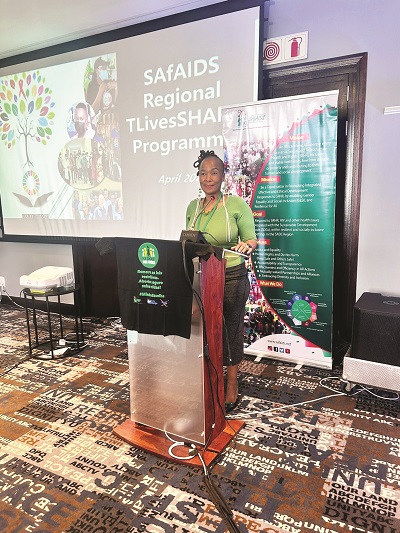Hon. Tšepang Tšita-Mosena says Dignity, Privacy, Safety are the three words that come to her mind when she hears the words “Sexual Reproductive Health and Rights”.
This week, alongside Hon. Senator Makholu Moshoeshoe and Rev. Maqebo Moshoeshoe, she is attending the SAfAIDS workshop on Championing FEmCAP (integrating Feminism, Economic Empowerment & Climate Action Approaches to Prevention of Early and Unintended Pregnancy) for Adolescent Girls & Young Women (AGYW) in the SADC Region, and as a result, is incorporating other key words; Intersectionality and Economic Growth.
She commends the Government of Lesotho for being intentional towards reducing the alarming MMR of 1155/100,000 by availing contraceptives services (family planning), maternal, newborn and child health (including ante-natal care & post-natal care), prevention & management of STIs (including HIV), comprehensive sexuality education, also addressing the scourge of GBV, child/early marriage, and other harmful practices, as well as menstrual hygiene management.
She further notes that even though abortion is still illegal in Lesotho, there is the necessary care given for post-abortion care saying, it is also worth considering to address mid-life concerns of men & women (including menopause and andropause).
Her concern is the post natal health service, which continues to expand a hole in the national economy, and that needs to be closed,
“When adolescent girls and young women, who are not homogeneous, are given access to the right information, are more in tune with their rights and needs, as well as the right services, are in control of their bodies, they will not likely find themselves with unwanted pregnancies.
“The drawbacks are among others; dropping out of school, sometimes putting their lives at risk trying to do away with the pregnancy and/or taboo on themselves, those who impregnated them or their families, and getting married at a very young age.
“However we should embrace other emerging challenges; mental wellness which has increased the strain on the public purse for need of stress management services, because unwanted pregnancies have a bearing on the confidence, acceptance and accessibility of age appropriate services.
“When one feels there is no solution, or is dealing with the aftermath of getting rid of unwanted pregnancy, including infertility or being cast by society, their only response can be detrimental to them”, says the Deputy Speaker.
Hon. Mosena says in addition, it has become important to recognise the differences in the diversity of everyone, in order to accommodate their needs as a human right above everything else, and leaving no one behind.
“We have to be very careful when we allocate resources, to intersect identities and diversity. We’re not born with the same privileges, challenges, and do not experience the same situations, so we cannot all have one uniform solution.
“Therefore as leaders even if we are uncomfortable with the reality because it is not ours, to someone it is who they are or what they are faced with. Empathy has to come to the fore,” she laments.
SAfAIDS is holding a workshop this week to equip regional policy-makers (political leaders) and, religious and traditional leaders with knowledge, skills and confidence to
- Apply more resilient multi-sectoral prevention of EUP actions, benefitting AGYW, and
- (ii) Catalyse their championing of regional SRHR policy transformation for Early and Unintended Pregnancies (EUP) prevention among AGYW, that take cognizance of climate and gender responsiveness.
This is in response to the challenge that the SADC region remains most affected by early and unintended pregnancies (EUP); deepened by the climate and economic crises, other shocks/stresses such as COVID-19, and anti-rights movements; which have worsened already fragile health and social protection services.
Several legal and policy provisions in the region, continue to limit adolescent girls and young women’s (AGYW) enjoyment of their SRHR and autonomy over their bodies. Determinants of sustained SRHR of AGYW, such as climate and economic crises and impact of COVID-19, and deepening gender inequalities implies need to equip policy-makers and religious and traditional leaders with added capabilities and confidence to integrate these resilience considerations in their EUP prevention championing.
SAfAIDS through the Regional TLivesSHARP Programme, contributes to strengthening capabilities among policy-maker’ and traditional and religious leader’ actor champions; with knowledge, skills and confidence to champion the prevention of EUP and its critical intersects with development issues including feminist principles, economic empowerment, climate action and gender equality.
The appreciation of these intersects will enable political, religious and traditional actors to apply more resilient commitments and actions. The overall objective is to equip regional policy-makers (political leaders) and religious and traditional leaders.
Hon. Tšepang Tšita-Mosena is a fearless activist for the rights of women and youth. She also fights for the private sector led economy in Lesotho. She has served as a legislator in the 10th parliament of Lesotho, and is the BAM Group Foundation (BGF) Ambassador. She remains engaged in advocacy for the marginalised; nationally and regionally.


